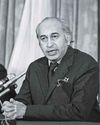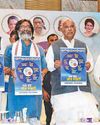
SEVEN decades ago, the eminent American political scientist, Professor Seymour Martin Lipset, published a seminal research paper, ‘Some Social Requisites of Democracy: Economic Development and Political Legitimacy’ in the authoritative American Political Science Review in 1959. His thesis was that advanced levels of literacy, industrialisation and urbanisation were required for democracy to succeed. It became an influential argument in those contentious days of the Cold War, and provided the Western policy elite a rationalisation for Washington’s support and patronage for military regimes in various continents.
Indian voters had neither heard of nor cared for Lipset. They definitely proved the Harvard professor repeatedly wrong, but most emphatically in 1977. Nonetheless, the voters reserved their most resounding refutation for the Lipset thesis till 2024 as for the first time, democracy as an ideology triumphed over fancy notions of strong-leader-led-autocracy.
The last 10 years have seen a very determined ideological assault on the idea of democracy, anchored in constitutional legitimacy. A tiny elite—a dozen favoured business houses, a band of technocratic bureaucrats, and a corrupt and corrupting media mafia—had enlisted the upper castes and upper classes in a Project Limited Democracy to install an anti-people policy regime. The 2024 vote came down to whether the masses wanted to lend their imprimatur to an all-powerful, unaccountable, and omnipresent State, which provides a shield to the power-hungry elite to carry on its greedy business.
Esta historia es de la edición July 01, 2024 de Outlook.
Comience su prueba gratuita de Magzter GOLD de 7 días para acceder a miles de historias premium seleccionadas y a más de 9,000 revistas y periódicos.
Ya eres suscriptor ? Conectar
Esta historia es de la edición July 01, 2024 de Outlook.
Comience su prueba gratuita de Magzter GOLD de 7 días para acceder a miles de historias premium seleccionadas y a más de 9,000 revistas y periódicos.
Ya eres suscriptor? Conectar

Trump, Up And Charging
'Many countries are nervous about Donald Trump returning to power, but India is not one of them'

Post and Past the Oil in Azerbaijan
As the UN climate conference takes place in Baku, Azerbaijan traces the history of the hydrocarbon industry through the lens of postage stamps

Bhutto's Nehru Story
Nehru's principle of \"compromise and argument\" remains the only workable formula for South Asian leaders

Breathless on Bachchan
Cédric Dupire's documentary The Real Superstar is an irreverent, experimental archive of Amitabh Bachchan's life and his stardom

The Anaphora to Zeugma of the Queen's English
Shashi Tharoor's book is a logophile's candy shop, full of fun, surprises and insights

The Wind Knocked
THE wind knocked on the door. Hesitantly. Wanting to be let in. It had heard the murmuring of the flames. And knew that there was a fire. The wind sought shelter.

The Way Home
“We comfort ourselves by reliving memories of protection. Something closed must retain our memories, while leaving them their original value as images. Memories of the outside world will never have the same tonality as those of home and, by recalling these memories, we add to our store of dreams; we are never real historians, but always near poets, and our emotion is perhaps nothing but an expression of a poetry that was lost.”—Gaston Bachelard, The Poetics of Space

The War Artist
Cartoonist and journalist Joe Sacco is in search of the truths distorted by conventional narratives

Mining Adivasi Votes
If the BJP manages to win Jharkhand, it will be the third mineral-rich state after Odisha and Chhattisgarh that will fall into the party's kitty

Unequal Republic
Political parties make promises of equal represention to women, but patriarchy continues to dominate electoral democracy